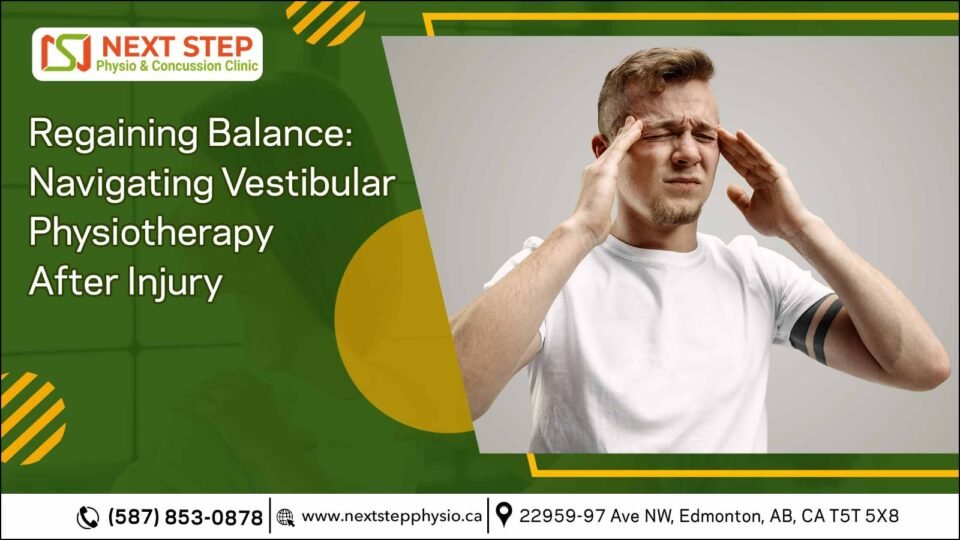Vestibular physiotherapy focuses on treating balance and dizziness issues, particularly prevalent after certain types of injuries or medical conditions. In Edmonton, clinics like Next Step Physiotherapy offer expert vestibular physiotherapy services, providing relief and solutions to those suffering from vertigo and balance disorders. This post explores how vestibular physiotherapy in Edmonton can help patients regain their balance and stability, significantly improving their quality of life.
1. Initial Assessment
Vestibular physiotherapy begins with a thorough assessment, where therapists in Edmonton conduct various balance and eye movement tests to diagnose vestibular disorders accurately. They assess how different positions or movements affect symptoms like dizziness and balance. The diagnosis may involve observing nystagmus (involuntary eye movement), which is often linked to inner ear issues. This initial evaluation is critical in identifying the specific vestibular condition, be it BPPV, labyrinthitis, or vestibular neuritis. Understanding the patient’s daily challenges due to these symptoms is also a key part of the assessment process.
2. Customized Rehabilitation Programs
Rehabilitation programs in vestibular physiotherapy are highly personalized based on the patient’s unique symptoms and lifestyle requirements. These programs could include a combination of exercises aimed at improving balance, reducing dizziness, and enhancing overall vestibular function. The exercises are progressively updated as the patient’s condition improves, ensuring continuous and effective rehabilitation. Edmonton physiotherapists also consider the patient’s daily activities and work requirements when designing these programs. The aim is to enable patients to return to their routine as safely and quickly as possible.
3. Balance Retraining Exercises
Balance retraining exercises in vestibular physiotherapy involve a series of activities designed to improve stability and coordination. These exercises often include standing on different surfaces, walking on uneven ground, or performing tasks that require balance while moving. They help retrain the brain to process balance signals from the vestibular system correctly. For patients in Edmonton, these exercises are tailored to simulate everyday situations, enhancing their practicality and effectiveness. Over time, these exercises significantly reduce the risk of falls and increase confidence in performing daily activities.
4. Gaze Stabilization Techniques
Gaze stabilization techniques are essential for patients who experience dizziness or visual disturbances with head movements. The exercises involve focusing on a stationary object while moving the head, improving the vestibulo-ocular reflex. They help patients in managing symptoms like blurred vision or dizziness, which are common in vestibular disorders. These techniques are particularly effective in improving reading ability, watching TV, or using a computer. For many patients, these exercises lead to a noticeable improvement in quality of life.
5. Canalith Repositioning Maneuvers
The Epley and Semont maneuvers are common canalith repositioning techniques used to treat BPPV. These maneuvers involve particular head and body movements to move the dislodged crystals in the inner ear back to their original position. They are often effective in providing immediate relief from dizziness and vertigo symptoms. In Edmonton, trained physiotherapists perform these maneuvers with precision and care. Patients are also taught how to perform modified versions of these maneuvers at home safely.
6. Habituation Exercises
Habituation exercises are designed for patients who experience dizziness due to motion sensitivity or visual stimuli. These involve repeated exposure to the triggering movements in a controlled manner. Over time, these exercises reduce the brain’s overreaction to movement, diminishing dizziness. They are particularly beneficial for individuals who experience motion sickness or dizziness in moving vehicles. Habituation exercises are an integral part of the treatment plan for long-term management of vestibular symptoms.
7. Education and Self-Management Strategies
Education about the vestibular system and its role in balance and orientation is a key component of vestibular physiotherapy. Patients are taught how to manage the symptoms effectively, including strategies to cope with sudden bouts of dizziness. Self-management education also includes lifestyle modifications that can help reduce the severity of symptoms. Understanding triggers and learning how to avoid them is also essential to patient education. This empowerment through knowledge enables patients to take control of their condition and manage it effectively.
8. Neurological Rehabilitation
Neurological rehabilitation is crucial for patients whose vestibular issues are linked to a neurological condition. This therapy includes exercises that improve overall brain function, balance, and coordination. Techniques are aimed at enhancing the nervous system’s ability to process and respond to vestibular information. Cognitive exercises may also be included to improve concentration and memory, which can be affected by vestibular disorders. This holistic approach addresses the broader impacts of neurological conditions on a patient’s life.
9. Multisensory Training
Multisensory training involves exercises that integrate and improve the processing of visual, vestibular, and somatosensory inputs. This training helps patients better manage complex environments with multiple sensory inputs, like crowded places. Exercises may include activities that challenge the patient to maintain balance while processing visual and auditory information. This approach is effective in enhancing the brain’s ability to adapt and respond to varied sensory experiences. For many patients, multisensory training significantly improves their ability to perform daily tasks more efficiently.
Restoring Balance with Expert Care
Vertigo physiotherapy in Edmonton offers a path to regaining balance and stability after injury or illness. In Edmonton, clinics like Next Step Physiotherapy provide specialized care to help patients overcome the challenges of vertigo and dizziness. From detailed assessments to customized rehabilitation programs, their expert team ensures that each patient receives the support they need to navigate their recovery journey successfully and regain their footing in life.


